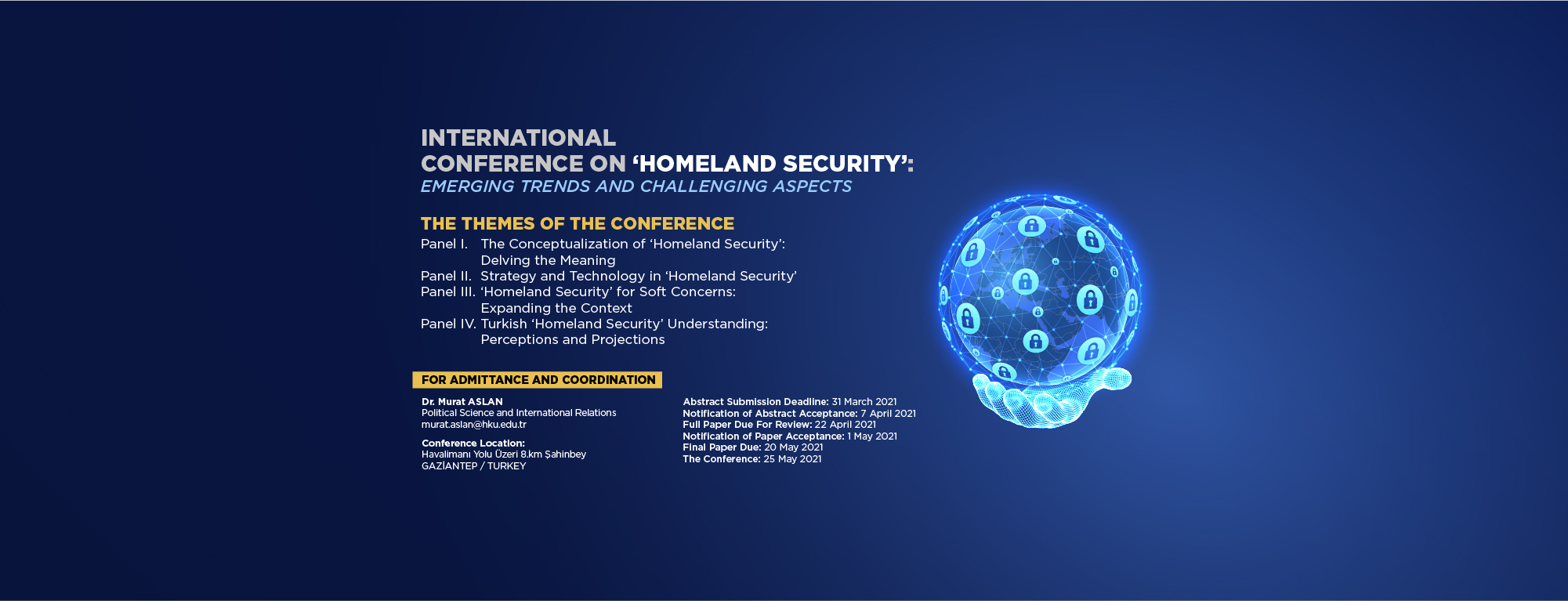INTERNATIONAL CONFERENCE ON ‘HOMELAND’ SECURITY
Security is cost-free indispensability for all brands of actors to enjoy civility and regularity. Widened and deepened structure of security push state actors more aligned with prerequisites of current and future developments within the probability of their projections, which actually challenge the sense of security itself. The quest of reaching a ‘secured’ environment somehow de-securitizes the state actors due to competing ‘multiple and complex’ units, motivated by contradicting goals. Other than states, a range of units are either dependent or challenger to the security architecture of the state actors. Given the spectrum of individual human, social groups, society at all, transnational society, non-state actors either armed or not, and finally humanity as a whole that covers the future generations; states are concerned, constrained and committed to achieve security by newly emerging aspects and means.
The security conceptualizations comprise of both hard and soft concerns of modern life. In this sense, military continues to be the essential pillar of the security establishments though; the intangible factors such as societal rights and order, prosperity, rule of local and international law, environmental concerns, rights of varying units of analysis, or the single word of equity and respect have become new parameters of displaying a secured life. Hence, states are still in charge of responding the mentioned concerns. But it is a fact that states are short of settling them since the root causes of ‘modern’ threats and concerns, along with the ones who are exposed, are not only the state actors but the overall range of afore mentioned units of analysis. On the other hand, the 9/11 beamed a new wave of assessments to review the widening and deepening security themes retreating the modern interpretations of it to the hard power practices across the new emerging term ‘homeland’, mainly in the USA. The usage of this term argues the integrity of the demarcated country against any threat type even through ‘pre-emptive measures’ though; threat conceptualization has changed as can observed by the perceived societal security against immigration and environmental and humanity security under the shade of climate change.
The transforming security conceptualization, which is erected upon the homeland rather than institutionalized state, has reinvented a meaning by a struggling effort and reinterpretation. The term includes both state and non-state structures in a country, along with the concerns as is partially listed above. The legal amendments after the 9/11, again in the US case for instance, connotated the ‘homeland’ as the unit to be protected while it has become a cause of legitimization and justification of security measures and aggressiveness that could have perceived as breaching the fundamental rights. In this context, the concept of ‘pre-emptive strike’, claimed by the Bush administration of then, has found its eligibility in this word while overseas operations, like the ones in Afghanistan and Iraq, are justified in the eyes of the American public. The USA does have sui generis ‘homeland interpretation’ that makes hard power practices normalized in the sovereign lands of the other countries, either with or without consent.
The over-stretching American example is struggling to confirm itself by the usage of the word ‘homeland’ after equivocal debates on the intentions and obtained outcomes. It became apparent that ‘homeland’ based security engagements exceeded the original cause of its usage. American perception is inspired by 9/11 attacks and furthered by DAESH threat as a new brand of Al Qaeda-like unit that could have been territorialized. Hence the USA was, and still is, committed to exploit its hard power assets in the overseas operations to ensure the security of her ‘homeland’ thousands of miles away from the north of the American continent.
Turkey, similar to the USA, demarcates ‘homeland’ by the sovereign areas of land, sea and air space. This new term has gained reputation for Turkish public mainly by the ‘Blue Homeland’ term due to the disputes on the eastern Mediterranean and Aegean Seas. Hence, as an inadequately conceptualized term, ‘homeland’, diffused to the sentiments of politicians and regular citizens, thanks to the circulating news in media. ‘Homeland’, thus, covers a hard-power contextualization to ensure the sovereign rights of Turkey. But the question is if homeland security is composed of the extension of land, sea-land and airspace or more than that limitation with post-positivist contextualization. If the overall expansion and depth of ‘security’ in the IR literature is concerned, ‘homeland security’ appears to be beyond the hard power measures.
This conference is dedicated to delving the conceptualization of ‘homeland’ security in the global and Turkish intelligentsia as comparative theme and investigates the course of this phenomenon. For this purpose, the main argument of the Conference is that “Homeland security is not only to defend against and by hard means but also addresses soft concerns by soft means”. The overall question to be answered is identified as “Does the homeland security perception cover multi-unit and multi-concerned risks and threats responding national, transnational, and international challenges?”. In this sense the Conference will examine the questions, which are delineated under the session discussions.
The Conference will have four panel sessions, which will either be physically attended or through virtual meetings. Each panel will have a moderator with a keynote speech and panelists to present their proceeding for the critiques, comments or contribution by distinguished scholars. The language of the Conference is English and Turkish for the comfort of audience.

